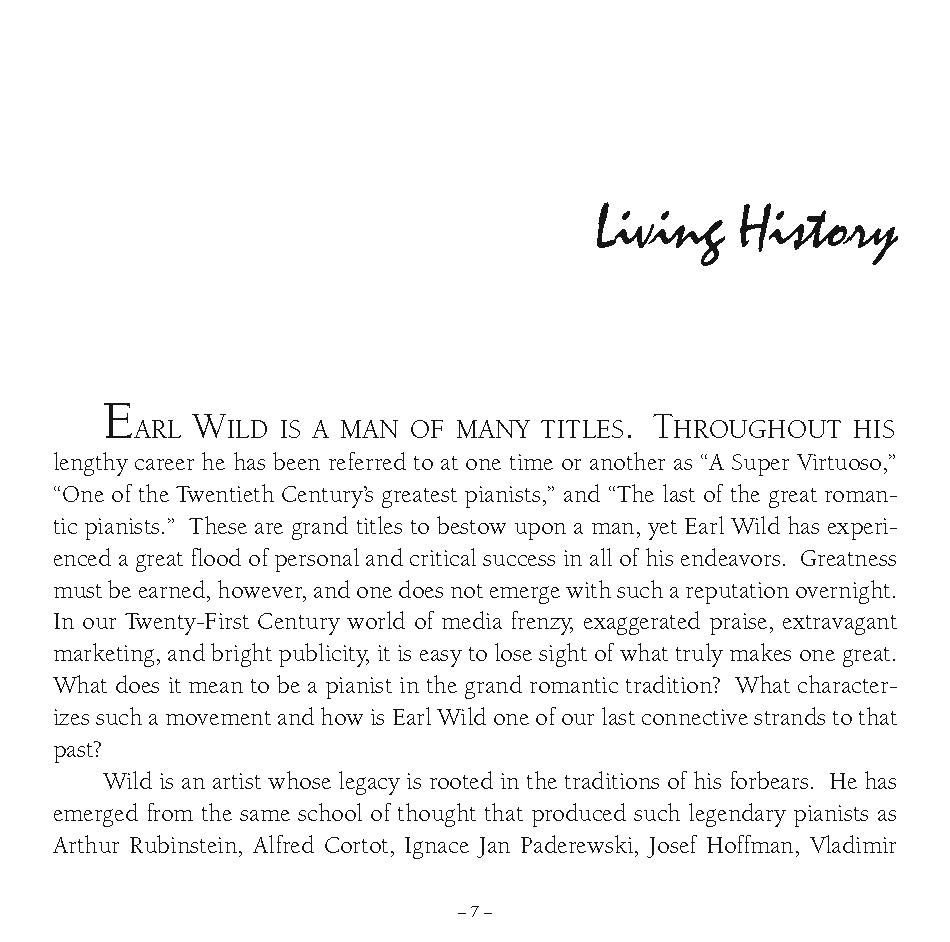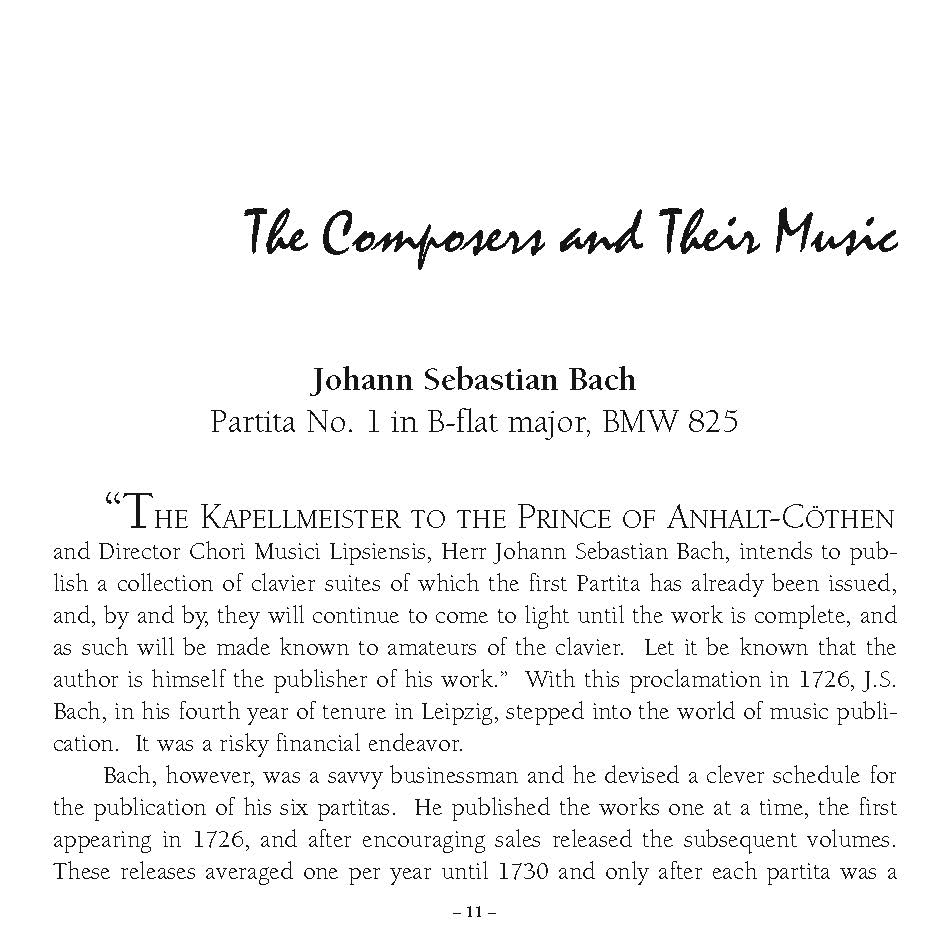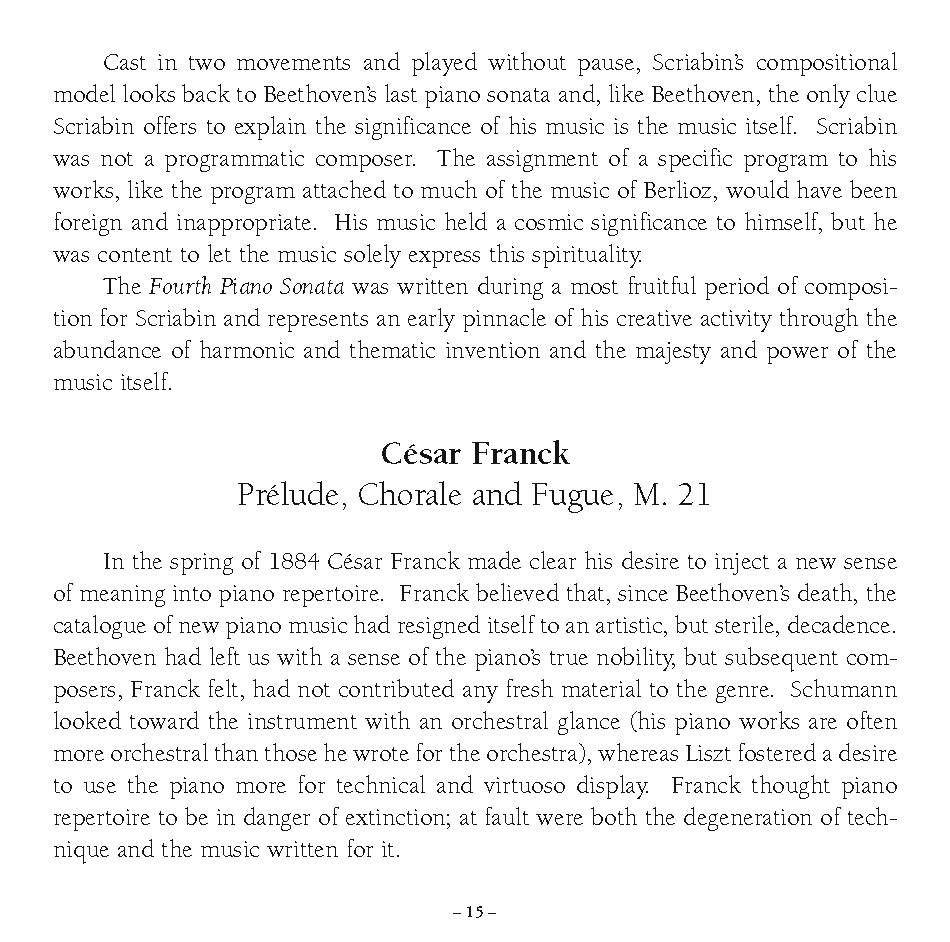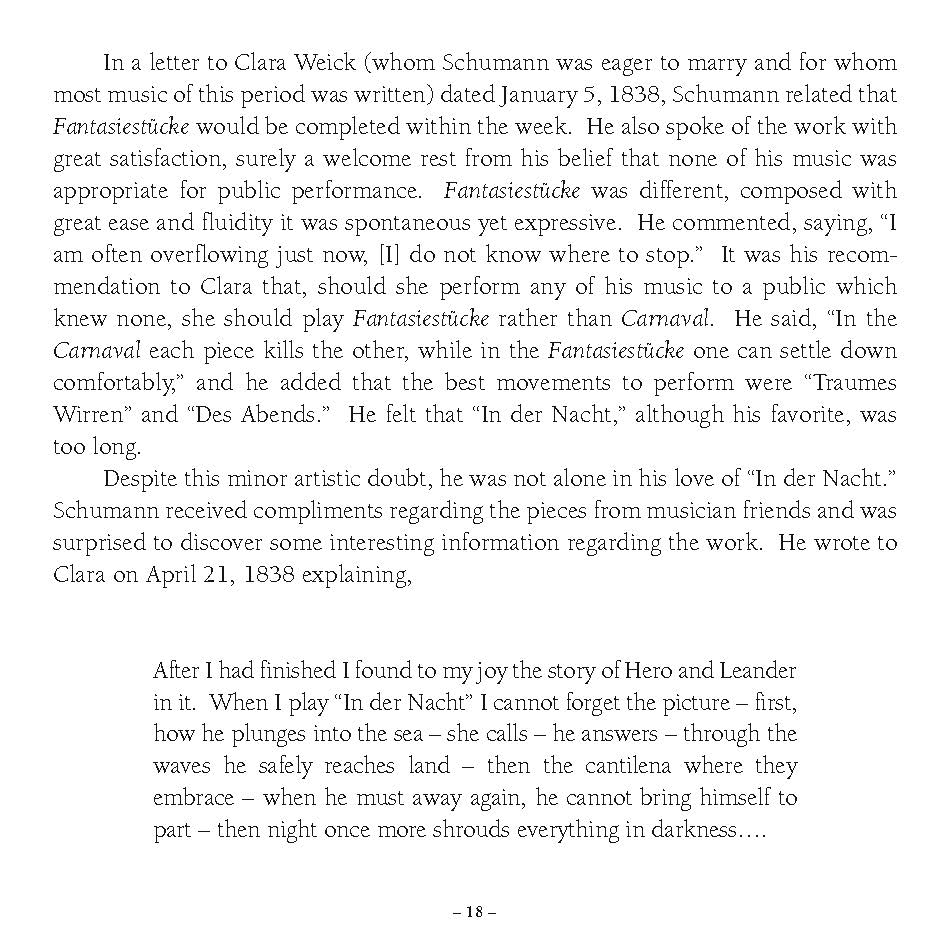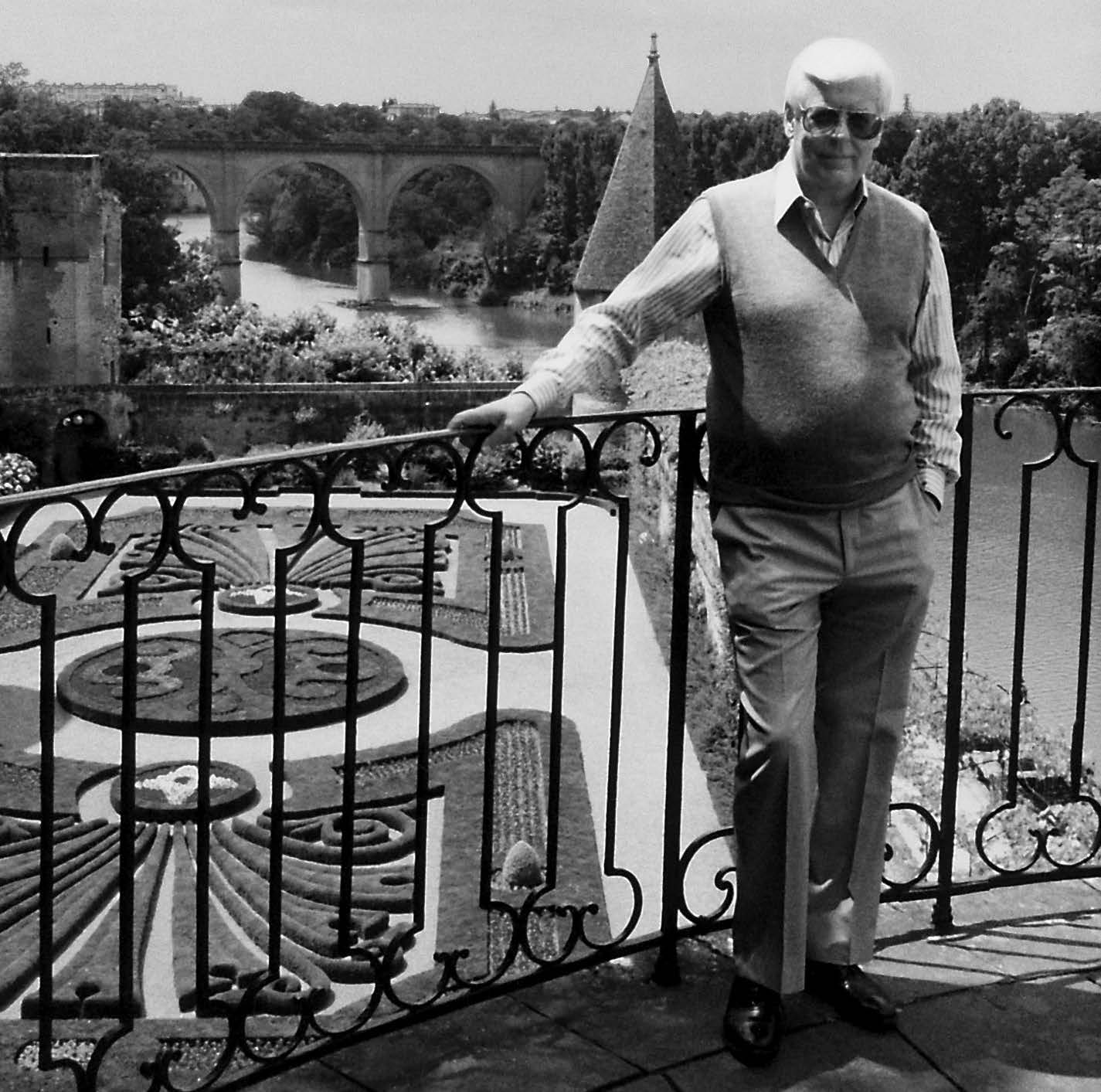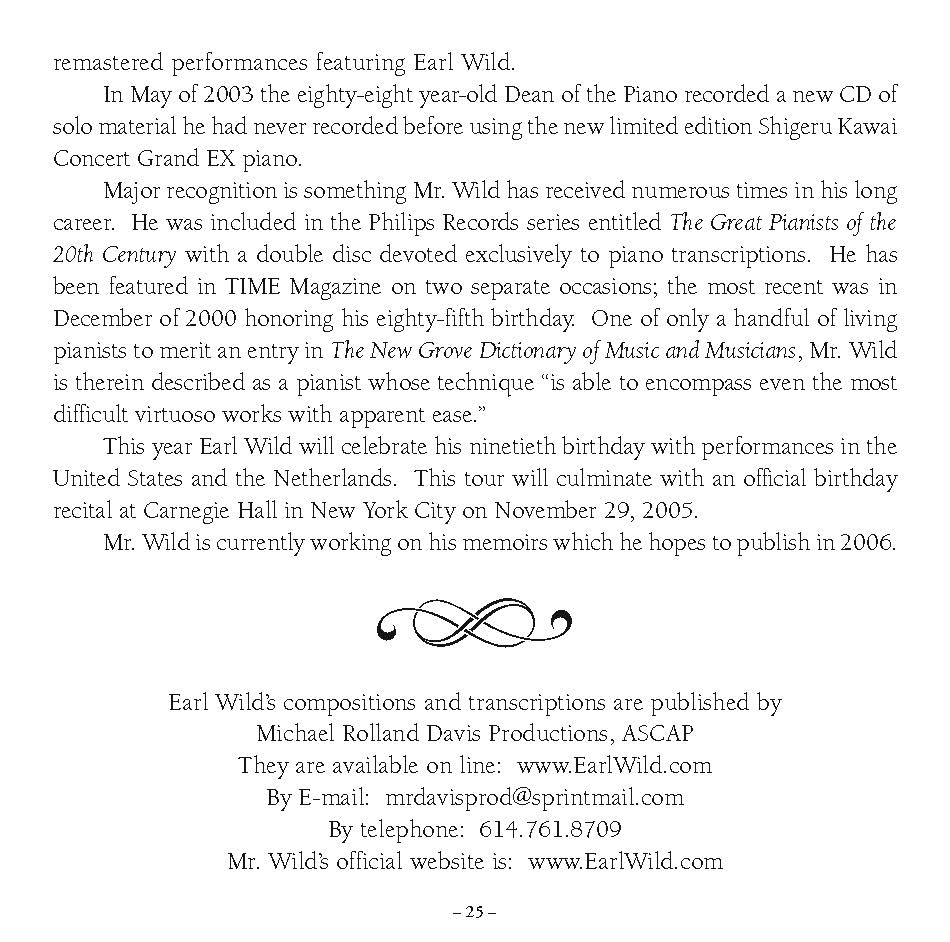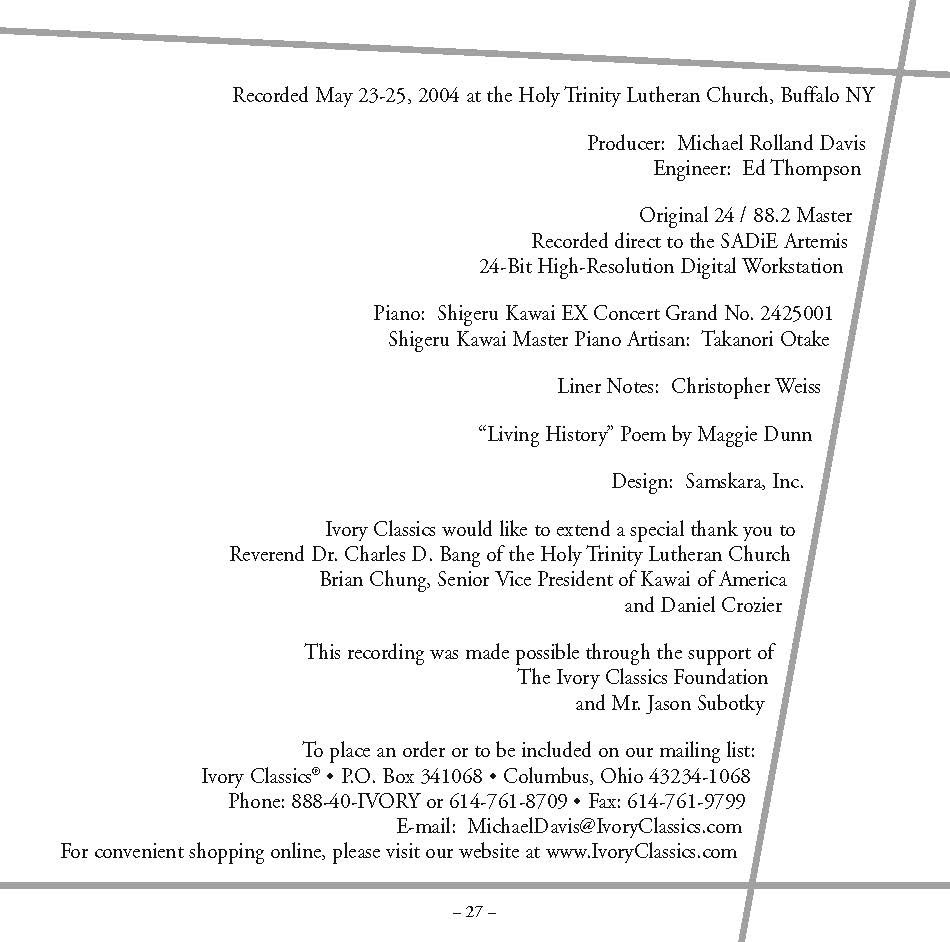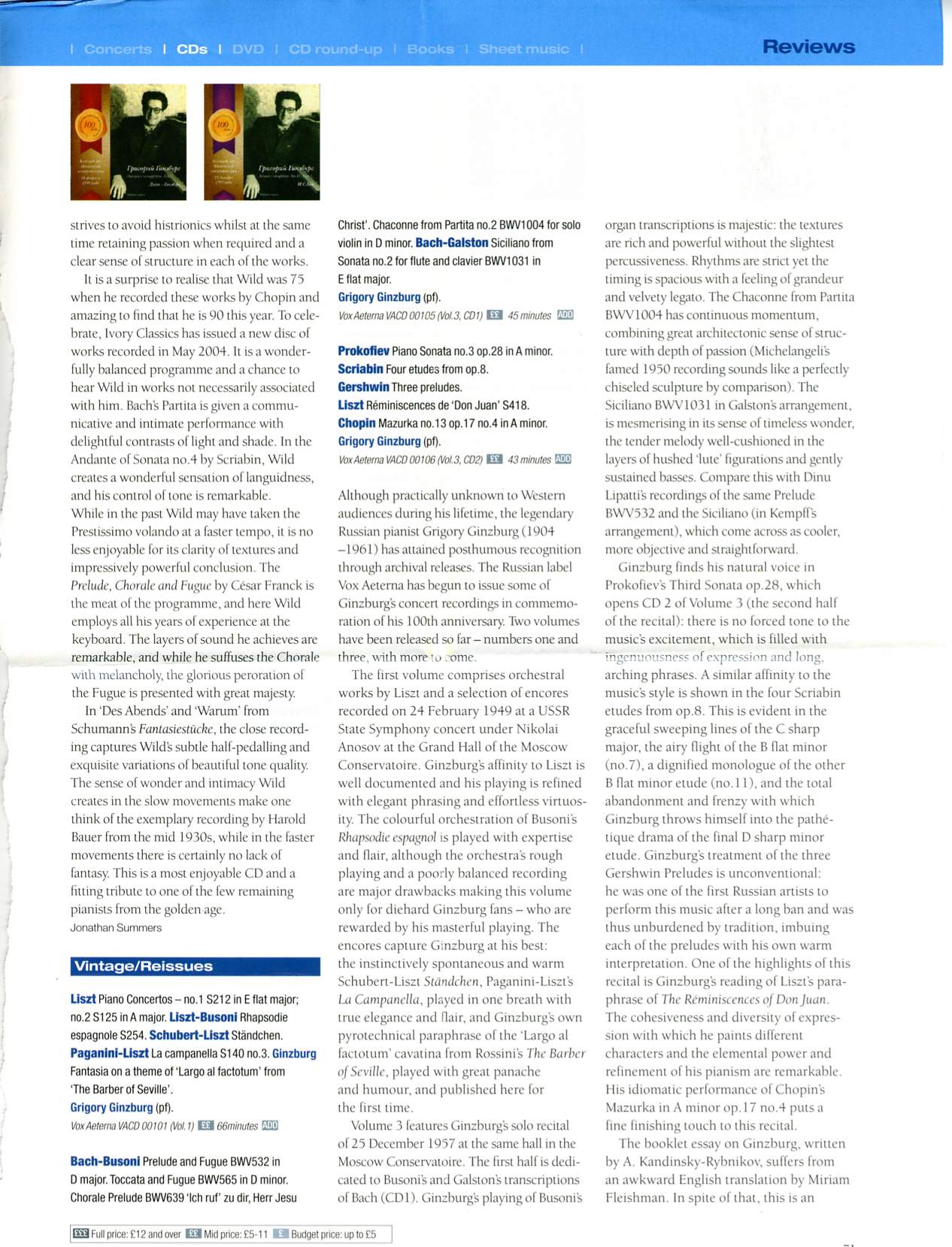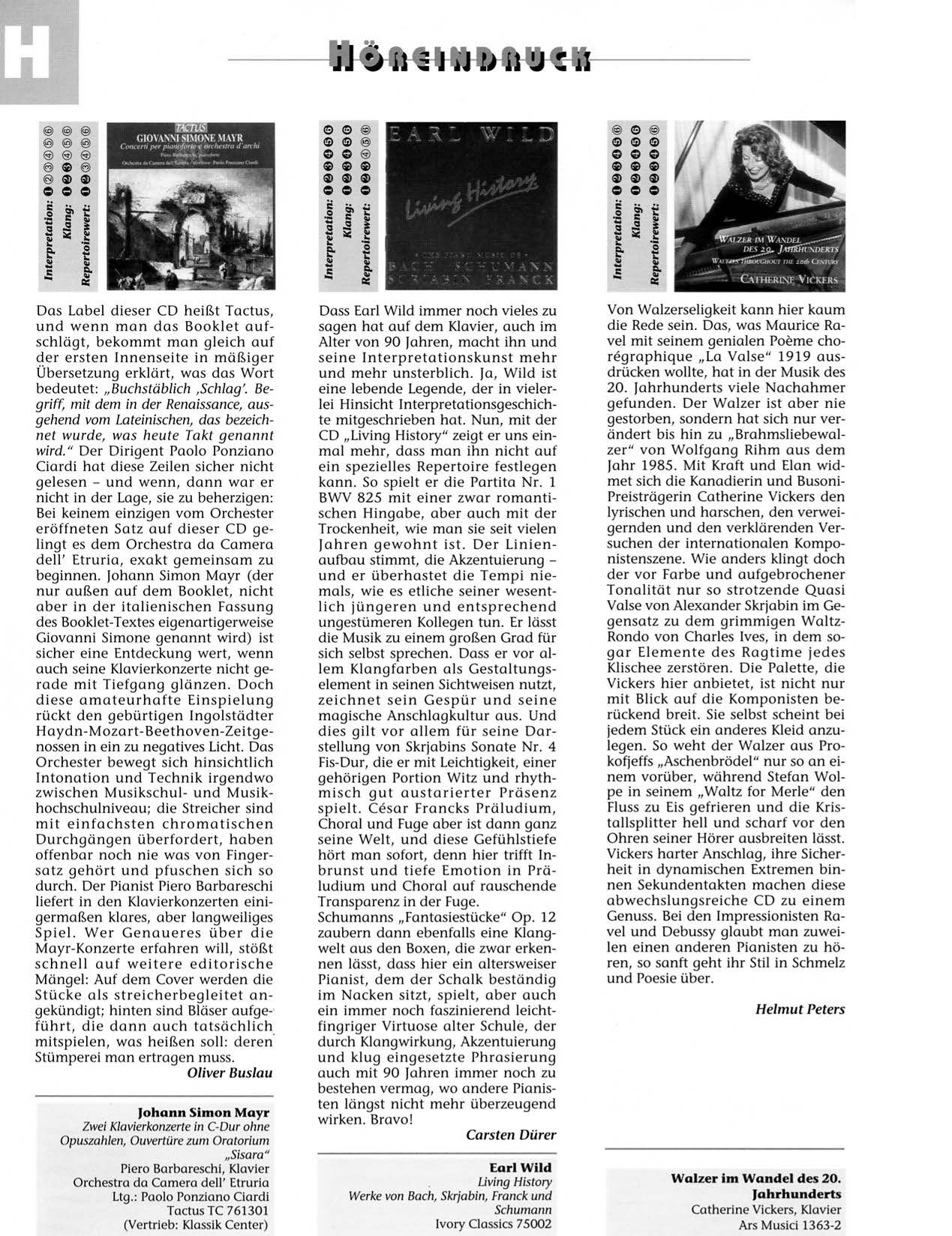Earl Wild: Living History - Bach, Franck, Schumann, Scriabin
Earl Wild: Living History - Bach, Franck, Schumann, Scriabin
Couldn't load pickup availability
Ivory Classics CD-75002
Earl Wild: Living History
Johann Sebastian Bach (1685-1750)
Piano: Earl Wild
Producer: Michael Rolland Davis
Engineer: Ed Thompson
Piano Technician: Takanori Otake
Total Time: 74:15
Recorded May 23-25, 2004 at the Holy Trinity Lutheran Church, Buffalo NY
A new 24/88.2 High Definition recording. All pieces were recorded for the first time by Earl Wild. Bach Partita No.1, Scriabin Sonata No.4, Franck Prélude Chorale and Fugue, M. 21, Schumann Fantasiestüke, Op. 12.
Original 24 / 88.2 Master Recorded direct to the SADiE Artemis 24-Bit High-Resolution Digital Workstation
Piano: Shigeru Kawai EX Concert Grand No. 2425001
Liner Notes: Christopher Weiss
"Living History" Poem by Maggie Dunn
Design: Samskara, Inc.
In advance of the great pianist Earl Wild's 90th birthday this year (2005), this new CD is an extraordinary document of Mr. Wild's famous virtuosity and technical dexterity intact at 89 years of age. In 2004 he recorded this recital of immensely demanding repertoire - Bach's Partita No 1, Scriabin's Sonata No 4, Franck's Prelude, Chorale and Fugue, and Schumann's Fantasiestucke. Living History is a remarkable presentation of a master at the top of his form. Three of these works are being recorded for the first time (Bach, Scriabin, and Schumann). The tone Mr.Wild extracts from the Sigeru Kawai Concert Grand is stunning. Now in his ninetieth year, Wild clearly shows that he has the grand spirit of the great romantic masters of the past plus a strong foothold in the Twenty-first Century. (DDD) 74 minutes.
Disc.Reviews
Old pianist learns new tricks
How much artistic growth can you expect of a musician at the age of eighty-eight? When you're Earl Wild, the sky's the limit. As witness, Living History, a recital of four major works the great American pianist had never recorded before. An artist of boundless energy, his interpretive skills and keyboard prowess undiminished by age, he was quick to draw new insights from composers with whom he hadn't been generally associated.
Beginning with J. S. Bach's Partita No. 1 in B-flat, BWV 825. Here the Prelude is brief, throwing the major emphasis on the following suite of five dances. Wild's performance emphasizes the tension between the clarity of Bach's writing and the emotion under it. His sure technique places the contrapuntal structure of dances like the Courante and the Gigue in bold relief, bringing out some interesting syncopations in the process. In Minuets 1 and 2, he takes the first dance very quickly, so you'd almost swear it was in duple time (though in fact it is in 4/4, as a Minuet should be), emphasizing the contrast with its double.
Until I heard the present recording of Sonata No. 4 in F-sharp, I'd always been rather cool toward the keyboard music of Alexander Scriabin. Most of the recordings I'd heard failed to dispel the impression of the Russian composer as an incontinently rhapsodizing decadent, pretty but insubstantial. Not Earl Wild! He invests his Scriabin with a stronger sense of rhythm than anyone I've ever heard, brining out the syncopated relationships of adjacent measures, as well as the composer's rich post-Wagnerian harmony. Ditto Cesar Franck's Prelude, Chorale and Fugue, which Wild gives a much more vital performance than I've ever heard of this work while preserving its strict formal relationships.
When we arrive at Schumann's Fantasiestücke (Fantasy Pieces), Op. 12, we have a composer that the pianist approaches with all the ardor of a new love late in life. From his earlier Ivory Classics recitals, we've learned to expect something special from Earl Wild's Schumann, and we aren't disappointed. These quirky, rhythmically varied and complex pieces demand the utmost of the interpreter, and Wild is equal to the task."Des Abends" (Evening) is a dreamy nocturne with an emotionally complex middle section."Grillen" (Whimsies) is a stately dance whose pulse in interrupted by some tricky metric and time changes in the middle."Traumes Wirren" (Tangled Dreams) really lives up to its name, its frantic pace arrested by the insertion of a held-back bar (ritenuto) and a more relaxed chorale section. The fun seemingly never ends until the final piece"Ende von Lied" (End of the Song), rendered by Wild with a noble eloquence.
In keeping with the mood of discovery in this recital, Mr. Wild plays what for him was a new instrument, a Shigeru Kawai EX Concert Grand. With its full sound and attractive, intimate warmth, it serves the needs of the artist and the music very nicely. The recordings, made May 23-25, 2004 at the Holy Trinity Lutheran Church, Buffalo NY by producer Michael Rolland Davis and engineer Ed Thompson, are first-rate.
New Classik Reviews, Jan. 2007
Earl Wild was 88 when he recorded this recital, and it's amazing how he's kept his legendary technique intact while continuing to evolve as an artist and explore new territory. For example, you'd never think of Wild as a Bach player. Yet his crisply-articulated B-flat Partita simply dances with joy in every movement, replete with felicitous ornaments and color shifts on the repeats. Indeed, such natural, beautifully proportioned, and utterly unpretentious Bach pianism comes as a relief in the face of concurrent releases like Daniel Barenboim's schlumpy, self-important Well-Tempered Clavier Book 2 or Cédric Tiberghien's smooth, tensionless Partitas.
Wild takes a straightforward and more literal than usual path through the Scriabin Fourth Sonata's feverish byways. What gorgeous textural differentiation the pianist achieves in the first movement, although I'd like a little more freedom and emotional abandon in the finale than Wild concedes. Wild's earlier recording of Franck's Préude, Chorale, and Fugue (released on an Audifon LP, and not available on CD to my knowledge) yields to a lighter, more fluidly shaped remake that easily ranks among the work's points of reference, including Rubinstein, Hough, Richter, and Cortot.
In comparing Wild's Schumann Fantasiestücke with the version Rubinstein recorded in 1976 at age 89, I venture to say that Wild sounds considerably less than one year younger! Aufschwung manages to be both lightfingered and vehement, while the pianist gives Grillen's full-bodied chords and emphatic accents their all. He also clarifies In der Nacht's turbulent 16th-note accompaniment with less pedal and more tonal variety than we often hear, and effortlessly tosses off Traumes-Wirren's whirling difficulties. And in Warum, the duetting melody lines almost sound as if they're coming from two different pianos. In sum, keep your eye on this talented young pianist: he's going places!
Jed Distler, Classics Today, Nov. 2005
Living History BACH: Partita 1; SCRIABIN: Sonata 4; FRANCK: Prelude, Chorale, & Fugue; SCHUMANN: Fantasy Pieces Earl Wild-Ivory 75002-74 minutes
This, Wild's most recent disc, was recorded in 2004 when he was 88 on a Kawai Concert Grand piano--a remarkably beautiful instrument, having a somewhat different sound and overall effect than either a Steinway or a Baldwin. Moreover, the sonics of the recording are faultless. I will try to take a stab at describing Earl Wild's playing--so Olympian, so artistic, that every measure is a pure delight for the listener.
The Bach Partita ripples along with exquisite taste and fluidity. Although we have become accustomed to thinking of Wild as an ideal exponent of the romantic literature, and he is, in fact, billed as "the last of the great romantic pianists", he reveals in his playing of this baroque composition a perfect stylistic intuition for that period. He generally introduces slight changes of ambiance and ornamentation in the repeats of the binary-form dances, and this enhances the aspect of spontaneity. Scriabin's two-movement Fourth Sonata has been for a long time my favorite among his ten. Has it ever been performed with such clarity, variegation of color, and tonal opulence as Earl Wild does here? I doubt it.
In Franck's solo piano masterpiece, the sublime Prelude, Chorale, and Fugue, we sense that the performer is himself a composer and can bring to it all the understanding and intellect that this implies. Wild makes it sound astonishingly easy and builds up to an entirely cohesive and brilliant impression with it. I must say that I still cling to Rubinstein's matchless recording (RCA), which has a little more atmosphere, nuance, and digital finesse.
Schumann's eight genial Fantasy Pieces, Op. 12, prove spellbinding, often intense, and always meticulous in Wild's exemplary interpretations; but, as always with this artist, moderation, balance, and musical insight prevail. The two most difficult pieces, 'Traumes-Wirren' and 'In der Nacht', are especially enchanting.
Mulbury, American Record Guide, Nov. 2005






